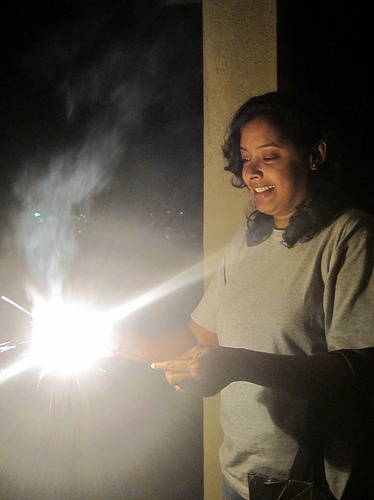–This version corrects the date of the first referendum on the fireworks ban. The year was 2009.
For the second time in two years, San Juan County voters will be asked to decide whether to ban the use of all personal fireworks, specifically those considered “safe and sane,” which include sparklers, fountains and pinwheels.
If you’re among those who thought this issue had already been put to rest, that’s understandable. After all, voters in 2009 upheld a would-be law, by 535 votes (53 percent), which made safe and sane fireworks as illegal to use as the more explosive kinds, and subject to a $250 fine for a first offense.
So on the eve of the Nov. 2 election, here’s a refresher that is intended to bring voters back up to speed.
In June 2008, the County Council voted without dissent to ban the use of safe and sane fireworks at the behest of the local fire chiefs’ association, a county-wide committee of public safety officials that includes the sheriff. The law, which was slated to take effect by July 4 of the following year, was put on hold after its opponents, led by Blakely Island-based Fireworks Unrestricted, collected enough signatures to challenge it at the ballot box as the second-ever county referendum.
Though backed by voters, the ban was overturned by Superior Court Judge Don Eaton after the ballot measure describing the referendum prompted a legal challenge by Blakely Island’s Don Burkhart, founder of Fireworks Unrestricted. In a ruling handed down in March, Eaton determined county officials failed to notify Burkhart of several changes made to the referendum’s “ballot title,” as required by state law, prior to the election, and that it must go back before the voters as a result.
Burkhart contends changes to the ballot title led to confusion in the mind of voters. He believes eliminating that confusion is the key to generating enough votes to quash the ban. He said the group has simplified its message – Reject the Ban – and that he and supporters have been canvassing the community, highlighted by a booth at the Fair, with the intent of educating voters.
Burkhart doesn’t dispute that fireworks, in concept, present a danger. However, he said that those that do are, in general, already outlawed under local law. Unlike those considered “safe and sane,” the use of fireworks that explode, like firecrackers, or that fly into the air, like Roman candles, is prohibited county-wide.
Sheriff Bill Cumming said the ban on safe and sane is backed by the fire chief’s association as a “step in the right direction” for public safety. Cumming added that an all-out ban on fireworks is becoming more common among cities and counties.
“It seems to be the trend in public safety to recognize the overall problems associated with fireworks,” he said. “Problems like personal safety, and fire, and the threat to the environment. On the days leading up to the Fourth of July, on the 4th, and on the days after, we do get a number of calls. We’re very busy. People call to complain about the noise, about livestock and about their animals’ reaction that accompany those fireworks.”
As it exists today, local law prohibits the use of fireworks that explode, like firecrackers, or fly into the air, like Roman candles. The use of so-called safe and sane fireworks, like sparklers or ground-spinners, has been allowed, though only on the 4th of July. The ban on safe and sane fireworks does not apply to professionally licensed pyrotechnic displays, which require a permit.
Cumming said the ban on safe and sane fireworks will help to enforce the law already on the books.
Burkhart believes an all-out ban is too steep a price to pay for making enforcement easier.
“Are there some problems?” he said. “Yes, there are, but almost exclusively with fireworks that are already illegal by state law. Acting on that by banning safe and sane fireworks is throwing the baby out with the bath water, and leaves us with the inherent contradiction of the need for a government-issued permit to celebrate our freedom.”




